Good morning!
Greetings in the name of Father, Son, and Holy Spirit.
Praying for you, your family, your community, and the rest of the world. Right now, the whole world is suffering because of the Coronavirus (COVID-19). Let’s pray together to God, Our Ever-Loving Father, His mercy and protection on all, and God’s healing on those who are infected by the Coronavirus. We all believe God’s grace and love rest on all who look upon Him every moment with faith in Him.
For in it the righteousness of God is revealed from faith for faith, as it is written, “The righteous shall live by faith. (Romans 1:17)
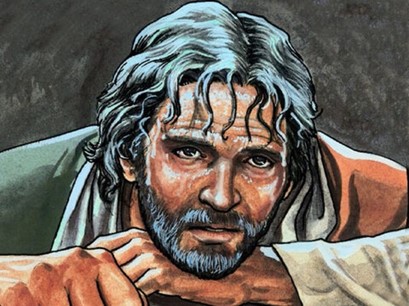
For this Lent season, following the last week, we continue experiencing Jesus’ 40 days’ suffering, temptation, and victory over the temptation by the Word. What Jesus did was not for Jesus, but for us. We are all weak, but God is strong. We are being tempted, but God is not. God is always faithful to us. Falling, failing, and suffering are inevitable to our human beings on earth, which are not an exception to us, believers. The reason why Jesus Christ came to this world was to experience all. Indeed, Jesus experienced all and to the extreme — 40 days’ fasting and temptation by the devil. Jesus also prayed before taking up the cross while knowing what’s coming to Him and His beloved disciples, who would soon abandon Him. Especially, Peter would deny Him before a small servant girl while cursing Jesus. Jesus knew all, and in the extreme pain and heartache, he prayed to God:
“Abba, Father, all things are possible for you. Remove this cup from me. Yet not what I will, but what you will.” (Mark 14:36b)
We can see Jesus was also human before the cross. Jesus cried out to God because Jesus knew what would come while being in extreme agony. Jesus prayed to God in such agony of spirit.
He prayed more fervently, and he was in such agony of spirit that his sweat fell to the ground like great drops of blood. (Luke 22:44)
What can we ask more?
Jesus was right there and experienced our weakness and struggle. Jesus truly sympathizes with our struggles out of our weakness and fear. What can keep us from coming to Jesus, who exactly knows our pains and struggle in our weakness and fear? That is the reason we call Jesus our dearest friend. Jesus knows all, especially our pains and even to the deepest part of our heartaches.
Jesus also showed the example of how to overcome our weakness, pain, and fear. Jesus cried out, but yet, He trusted God by putting everything before God. Jesus said, “Yet not what I will, but what you will.” This should be our confession in faith before our pains and fear. Jesus completely surrendered to God, and should we do.
Is it easy to surrender to God? No, absolutely not. Indeed, it is impossible. As mere human beings, we cannot. Then how can we be like Jesus, who completely surrendered to God? The answer is that it is only possible by the power of the Holy Spirit in us. The Bible tells:
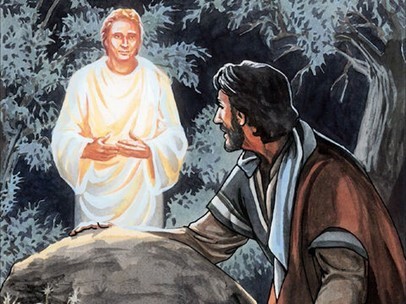
And the Holy Spirit helps us in our weakness. For example, we don’t know what God wants us to pray for. But the Holy Spirit prays for us with groanings that cannot be expressed in words. And the father who knows all hearts knows what the Spirit is saying, for the Spirit pleads for us believers in harmony with God’s own will. And we know that God causes everything to work together for the good of those who love God and are called according to his purpose for them. (Romans 8:26-28)
The Holy Spirit residing in us knows our weakness and helps us by praying to God so that we can be in harmony with God’s own will, which is absolutely good and perfect. God, who loves us, guides us according to His absolute goodwill to make all things, in us and around us, work together for good in God. The end state is the goodness of God, not the pain and agony in and around us. Yes, only can the power of the Holy Spirit unlock the goodness of God toward us, which is eagerly waiting for us. Thus, the Bible says,
We do this by keeping our eyes on Jesus, the champion who initiates and perfects our faith. Because of the joy awaiting Him, He endured the cross, disregarding its shame. (Hebrews 12:2a)
The Holy Spirit makes us fix our eyes on Jesus Christ, who died for us on the cross, and join the joy set before Him. Jesus saw the joy on the cross, and He endured. Thus, so we should, which is the worthy promise of God, and our eternal blessing from God so that we can win all things under all circumstances and proclaim the victory set before us. Today we will hear and learn from God by studying together the life of Ruth, who was not even a Jew, but a Gentile whom Jews looked down on and treated lower than human beings. But Ruth became the mother of the grandfather of King David. How could it be possible? Surely, it’s impossible by any earthly means.
The book of Ruth starts:
In the days when the judges ruled in Israel, a severe famine came upon the land. So a man from Bethlehem in Judah left his home and went to live in the country of Moab, taking his wife and two sons with him. The man’s name was Elimelech, and his wife was Naomi. Their two sons were Mahlon and Kilion. They were Ephrathites from Bethlehem in the land of Judah. And when they reached Moab, they settled there.
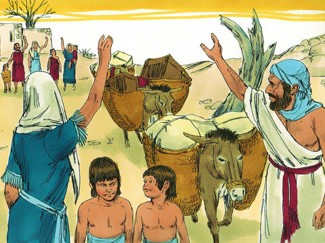
Then Elimelech died, and Naomi was left with her two sons. They continued living there, and the two sons married Moabite women. One married a woman named Orpah, and the other a woman named Ruth. But about ten years later, both Mahlon and Kilion died. This left Naomi alone, without her two sons or her husband.
When Naomi married Elimelech, they thought that they would live happily live after, as we all read from many happy ending stories. The couple believed God, together served God, and lived out their godly lives. All things should have had gone well without any life pains, but it was not the case. A severe famine came upon the land.
Elimelech and Naomi could have endured the famine with other fellow Jews in Bethlehem, but they chose to escape to Moab, the land of Gentiles. Moab’s land looked better without suffering from the famine hitting hard Bethlehem. Then Elimelech and Naomi arrived at Moab and lived there without returning to Bethlehem. They initially thought it was a temporary migration to Moab, just escaping from the famine, but they ended up permanently living in Moab. Can we see the pattern? Getting out of God is easy, but returning to God isn’t.
Elimelech suddenly died, and Naomi became a widow with her two sons. At that time, it was truly hard for a woman to live without a husband. Naomi’s case was much harsher. She lived in a foreign land alone where there were no supports from other families and relatives at all. Naomi could have had returned to Bethlehem, but she lived in Moab. She let her two sons married Moabite women, which was strictly illegal by the Jewish laws. Life in Moab was getting better again. Without knowing, Naomi and two sons became more and more like them. They were fully assimilated and enjoyed life in Moab. However, their joy in Moab did not last. Ten years later, suddenly, two sons died. It was a truly loud wake-up call for Naomi. Naomi ended up alone again with two daughters-in-law.
Naomi remembered the land where she came. She heard that God had blessed his people in Judah by giving them good crops again. So Naomi decided to leave Moab to return to her homeland. It took two sons and her husband before making such a decision. With her two daughters-in-law, she set out from the place where she had been living many years and lost both her husband and two sons. They took the road that would lead them back to Judah.
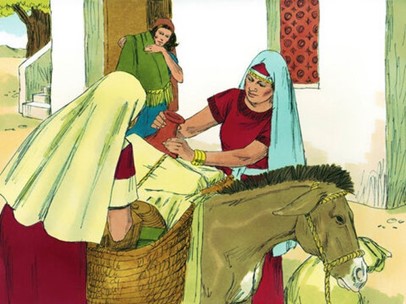
But on the way, Naomi said to her two daughters-in-law, “Go back to your mothers’ homes. And may the LORD reward you for your kindness to your husbands and to me. May the LORD bless you with the security of another marriage.” Then she kissed them good-bye, and they all broke down and wept.
“No,” they said. “We want to go with you to your people.” Initially, both Orpah and Ruth insisted on being with Naomi instead of returning to their land.
But Naomi replied, “Why should you go on with me? Can I still give birth to other sons who could grow up to be your husbands? No, my daughters, return to your parents’ homes, for I am too old to marry again. And even if it were possible, and I were to get married tonight and bear sons, then what? Would you wait for them to grow up and refuse to marry someone else? No, of course not, my daughters! Things are far more bitter for me than for you, because the LORD himself has raised his fist against me.”
Naomi knew what she had done before God, and felt that she deserved what she was getting, but it was not the case for her two daughters-in-law. Naomi finally did what was good and proper for two daughters-in-law before God.
Her two daughters-in-law were Gentiles. In Judah, Jews would treat them poorly. At that time, Jews thought there were two kinds of people: God’s people, themselves, and the others, Gentiles, whom Jews did not give the same level of human dignity. For the eyes of Jews, Gentiles were slightly better than animals. Naomi knew this, and she again tried to persuade them to go back to their land, where they would get equal dignity from the fellow Moabites.
And again, they wept together, and Orpah kissed her mother-in-law good-bye. Orpah heard and understood the heart of Naomi. Orpah chose to go back, while thanking Naomi.
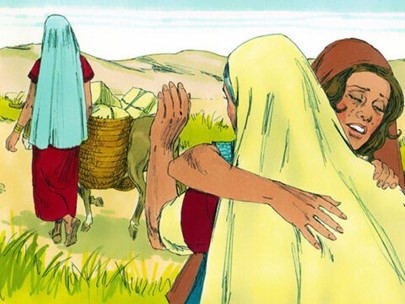
However, Ruth clung tightly to Naomi. “Look,” Naomi said to her, “your sister-in-law has gone back to her people and to her gods. You should do the same.” Naomi warned Ruth again out of her love for Ruth.
But Ruth replied,
“Don’t ask me to leave you and turn back. Wherever you go, I will go; wherever you live, I will live. Your people will be my people, and your God will be my God. Wherever you die, I will die, and there I will be buried. May the LORD punish me severely if I allow anything but death to separate us!” (Ruth 1:16b-17)
What a confession of Ruth’s faith! Ruth knew who God was, and Ruth learned this through Naomi, who was humbly coming back to God with repentance and hope. That is how non-believers know about God – through us. Then should we behave before God? People around us are constantly watching us. After carefully watching Naomi, Ruth chose God instead of her native people and land.
Indeed, we were Gentiles, but God called us out of the world. That is the reason why we call ourselves Christians who separate from the world. Do we have this conviction in our hearts that Ruth had? Not just when everything is good and comfortable, but when all things are not for us. Didn’t Ruth lightly choose God without knowing what would come to her when she chose God and went with Naomi into the land of Jews? Yes, she knew. She said, “your people will be my people” first before saying, “your God will be my God.” Ruth knew what would come, but she chose to be with Naomi while making such a beautiful conviction out of her faith in God!
When Naomi saw that Ruth was determined to go with her, she said nothing more. So the two of them continued on their journey. When they came to Bethlehem, the entire town was excited by their arrival. “Is it really Naomi?” the women asked.
“Don’t call me Naomi,” she responded. “Instead, call me Mara, for the Almighty has made life very bitter for me. I went away full, but the LORD has brought me home empty. Why call me Naomi when the LORD has caused me to suffer and the Almighty has sent such tragedy upon me?” (Ruth 1:20-21)
The people in Bethlehem joyfully greeted Naomi. The entire town was in joy because of her return. However, Naomi’s heart was really heavy. She could not be joyful with the people of Bethlehem because she was a sinner who left God and lived like a Gentile in Moab. After losing both her husband and her two sons, she came back in pain and bitterness. Her name, Naomi, means “pleasant.” But she could no longer bear her name because of what she did and what she received from God.
God’s wake-up calls sometimes are very harsh and make us truly bitter. If not, we would go back again because of the sweet taste. God has to make the bitterness much greater than the sweetness that we used to enjoy. We are all slow to learn and prone to forget. The bitterness from God is the best-blessed gift from God.
Naomi truly understood what she did, and she repented all. She asked all to call her with a new name, “Mara,” which means bitter. She could not afford to forget what she did and how God touched her out of the unfathomable love of God. Her contrite, humble, and repenting heart pleased God. God, then, moved on to the next step of His plan.
God started using His mighty but loving hand to correct and guide us. What we should do is to fix our eyes on God instead of the world. Indeed, God always prepared the next step to guide us through the paths of His righteousness. It is the beauty of being with God and walking with Him. The pain of Naomi was the prelude of God’s eternally blessed plan, not just Naomi, but all of us. Specifically, God started to make King David’s grandfather’s mother out of a Moabite woman, Ruth, who was not even a Jew, but a Gentile on whom all Jews looked down.
“For My thoughts are not your thoughts,
Nor are your ways My ways,” declares the Lord.
“For as the heavens are higher than the earth,
So are My ways higher than your ways
And My thoughts than your thoughts. (Isaiah 55:8-9)
Let’s see how God’s plan was unfolding. God made Naomi and Ruth return from Moab to Bethlehem last spring, at the beginning of the barley harvest. In Bethlehem, God prepared a wealthy and influential man named Boaz, a relative of Naomi’s husband, Elimelech. Who can plan like our God?
One day Ruth the Moabite said to Naomi, “Let me go out into the harvest fields to pick up the stalks of grain left behind by anyone kind enough to let me do it.” Ruth was a woman of courage. It was not even safe as a Moabite woman going out alone because she was not a Jewish woman, but one of the Gentiles treated like almost animals. Ruth knew this, but she said this to her mother-in-law, Naomi.
Naomi reluctantly replied, “All right, my daughter, go ahead.” There was no other opinion. Naomi was old, and they had no food. Someone had to go out to get food.
So Ruth went out to gather grain behind the harvesters. But God mysteriously guided her. And as it happened, she found herself working in a field that belonged to Boaz, the relative of her father-in-law, Elimelech. All started happening to Ruth, who boldly professed her faith in God.
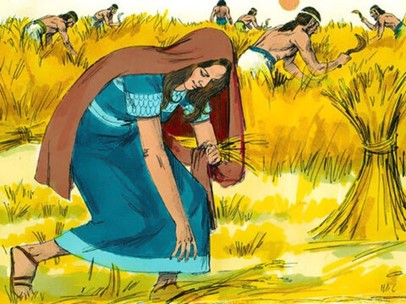
While Ruth was there, Boaz arrived from Bethlehem and greeted the harvesters. “The LORD be with you!” he said. Yes, God sent Boaz timely. Boaz was not there all the time, but when Ruth was there, God sent Boaz.
“The LORD bless you!” the harvesters replied.
Then Boaz asked his foreman, “Who is that young woman over there? Who does she belong to?”
And the foreman replied,
“She is the young woman from Moab who came back with Naomi.” (Ruth 2:6b)
What was the first answer to Boaz? The woman was a Moabite woman, who was a foreigner and a Gentile. She should have had not been here, but the only reason why the foreman allowed was that Ruth was related to Naomi.
However, God prepared the heart of Boaz. Boaz was kind to her. Here is a part of Boaz response,
“I have warned the young men not to treat you roughly. And when you are thirsty, help yourself to the water they have drawn from the well.” (Ruth 2;9b)
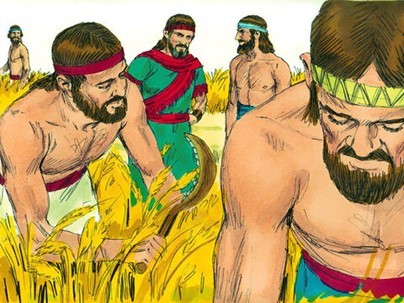
Boaz warned the young men, which tells how much Ruth took a risk while working in the field picking up some leftover grains. If Ruth were a Jew, Boaz would have had given such a stern warning to the young men. Ruth was a Gentile woman. Even so, Boaz lifted her and made her equal to the Jewish young men. Even a Jewish woman did not have such privilege at that time. That is what God did for Ruth who was a Gentile and a woman. That is, Ruth was nothing for the young Jewish men’s eyes, but God put her stand on the firm ground equal to the young men.
She was able to be with the young Jewish men without fear, as long as she was in Boaz’s field. Haven’t we gotten such a privilege from God? As long as we are in Him, we are His – His beloved daughters and sons, who inherit all good things from the above with the Son, Jesus Christ. What God loves to hear from us is our conviction in faith in Him — “You are my God, and your people are my people.”
One more thing that we want to learn from Ruth. Here is the comment from the Jewish foreman, who saw a Moabite woman working in the field all day,
She has been hard at work ever since, except for a few minutes’ rest in the shelter. (Ruth 2: 7b)
The foreman was initially hesitant for Ruth to gather grains behind the harvesters, but he did only because of Naomi’s name, not Ruth. But Ruth worked hard. Yes, harder than any harvesters. Who will resist such a hardworking person? The foreman appreciated Ruth’s hard work. We should not forget this. We are God’s workers, whom God sent to do God’s work for His glory. Then shouldn’t we work hard for God under all circumstances?
Ruth fell at his feet and thanked Boaz warmly. “What have I done to deserve such kindness?” she asked. “I am only a foreigner.” Ruth knew who she was. Her thanksgiving was genuine.
“Yes, I know,” Boaz replied. “But I also know about everything you have done for your mother-in-law since the death of your husband. I have heard how you left your father and mother and your own land to live here among complete strangers. May the LORD, the God of Israel, under whose wings you have come to take refuge, reward you fully for what you have done.”
Moaz knew what she did to Naomi, and Boaz blessed Ruth. Boaz warmly accepted Ruth as Jesus did to us.
Ruth replied, “I hope I continue to please you, sir. You have comforted me by speaking so kindly to me, even though I am not one of your workers.”

Boaz called to Ruth at mealtime, “Come over here, and help yourself to some food. You can dip your bread in the sour wine.” So she sat with his harvesters, and Boaz gave her some roasted grain to eat. So Ruth gathered barley there all day, and when she beat out the grain that evening, it filled an entire basket. She carried it back into town and showed it to her mother-in-law. God blessed Ruth, who had absolute faith in God, and Ruth also shared her blessings with Naomi.
It was the beginning of the relationship between Boaz and Ruth. Then later, Boaz decided to redeem the Elimelech family per Jewish tradition by getting married to Ruth. However, Boaz was next in line to redeem the Elimelech family after another relative. Thus, Boas called a town meeting to witness the redeeming act. Boaz asked whether the other redeemer to redeem or not.
The man replied, “All right, I’ll redeem it.”
Then Boaz told him, “Of course, your purchase of the land from Naomi also requires that you marry Ruth, the Moabite widow. That way she can have children who will carry on her husband’s name and keep the land in the family.”
“Then I can’t redeem it,” the family redeemer replied, “because this might endanger my own estate. You redeem the land; I cannot do it.” The requirement of marrying Ruth, the Moabite woman, immediately turned off the family redeemer. Who would get married to a Moabite woman as a Jew? None, except Boaz. Boaz was different and did not care about his reputation of marrying Ruth, a Moabite woman. Why? Boaz loved Ruth and cared for her as Jesus loved us who are sinners and Gentiles to His kingdom.
So Boaz took Ruth into his home, and she became his wife. When he slept with her, God enabled her to become pregnant, and she gave birth to a son. The son’s name is Obed, who was the father of Jesse. Jesse was the father of King David! Ruth, the Moabite woman, who was born in Moab, would have had lived and died in Moab, but Ruth followed her faith in God to Judah while professing her faith in God,
Wherever you go, I will go; wherever you live, I will live. Your people will be my people, and your God will be my God. Wherever you die, I will die, and there I will be buried. (Ruth 1: 16b, 17a)
Do we have such faith? Can we confess our faith in God under the most unfavorable situation, such as the threat of persecution? God searches for such an unconditionally faithful faith even today. When God sees such faith, He is truly pleased with the faith. Then God does the unthinkable as God did to Ruth, a Moabite woman. God made her a mother of King David’s grandfather.
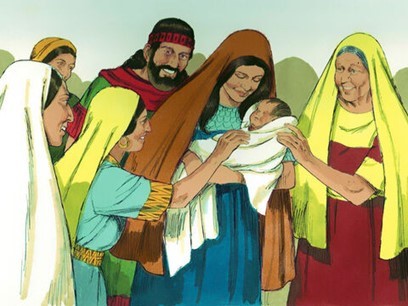
Boaz is the figure of Jesus Christ, who chose Ruth, a Gentile woman. Jesus chose us, who are foreign to His grace and filled with sins. Then Jesus transforms us into God’s children so that God can love us forever as His beloved children. God, who could become Ruth, the Gentile woman to a part of King David’s lineage, can do the same to us regardless of who we are and what we have done. What we need is our sincere conviction to God of our faith in Him – “You are my God, and your people are my people.”
The story did not end at King David. Jesus Christ, our Savior, came in the lineage of David. The book of Matthew starts,
This is the genealogy of Jesus the Messiah the son of David, the son of Abraham: (Mat 1:1)
Indeed, there are only two names of women in the genealogy of Jesus Christ, the Messiah, and one of them was Ruth:
Boaz the father of Obed, whose mother was Ruth,
Obed the father of Jesse,
and Jesse the father of King David. (Matthew 1:5b-6a)
Our God is merciful to the weak, encourages the mourn, and establishes the humble on the faith, and all who truly appreciate the inadequacy of receiving God’s grace. Ruth was one wonderful example in Bible. Out of her faith, God indeed established His eternal kingdom and His salvation plan. Our Savior Jesus Christ came in the lineage of King David, who was a great-grandson of Ruth. How blessed Ruth is!

And it is impossible to please God without faith. Anyone who wants to come to him must believe that God exists and that he rewards those who sincerely seek him. (Hebrews 11:6)
